Case Law Details
ITO Vs Rajshree Integrated Cold Chain Pvt. Ltd. (ITAT Kolkata)
ITAT Kolkata held that it is unjustified to assess share capital and share premium as unexplained cash credit u/s. 68 merely for high share premium as identities and creditworthiness of the share applicant and genuineness of the transactions duly established.
Facts- During assessment, AO noted that assessee has raised share capital including share premium, totaling for an amount of Rs.2,76,50,000/-. AO sought details and explanation on this from the assessee. Not convinced by the details and documentary evidence placed on record, Ld. AO by applying the test of human probability made the addition u/s. 68 of the Act.
CIT(A) after elaborately dealing with the facts of the case on all the three dimensions of section 68 of the Act in respect of identity and creditworthiness of the share subscribers and also the genuineness of the transactions, deleted the addition so made. Being aggrieved, revenue has preferred the present appeal.
Conclusion- Hon’ble Calcutta High Court in the case of PCIT Vs. Naina Distributors Pvt. Ltd. held that mere non-production of director cannot be the ground for making any addition in the hands of assessee u/s 68 of the Act.
Held that Hon’ble ITAT in the case of M/s Bisakha Sales Pvt. Ltd. v CIT has never held that share capital and share premium can be assessed as unexplained cash credit merely for high share premium even though the identities and creditworthiness of the share applicant and genuineness of the transactions have been established. What is held by the Hon’ble ITAT is that revision proceedings u/s 263 are valid where the transactions have been accepted as genuine without making proper enquiries.
FULL TEXT OF THE ORDER OF ITAT KOLKATA
This appeal filed by the revenue is against the order of Ld. CIT(A)-7, Kolkata vide order no. 478/CIT(A)-7/Ward-4(1)/Kol/15-16 dated 22.09.2020 passed against the assessment order by ITO, Ward-4(1), Kolkata u/s.143(3) of the Income-tax Act, 1961 (hereinafter referred to as the “Act”), dated 12.03.2015 for AY 2012-13.
2. Revenue has raised the following grounds of appeal:
“1. “That on the fact and circumstances of the case, the Ld. CIT(A) has erred in granting relief to the assessee on account of addition on undisclosed cash credit u/s 68 of Rs.2,76,50,000/- though the assessee has failed to prove the genuineness of transaction and creditworthiness of the share applicants.
2. That on the facts and the circumstances of the case, the Ld. CIT(A) has erred in overlooking the principles which has been laid down by the Hon’ble Supreme Court in the case of Pr.CIT(Central)-l, Delhi Vs. NRA Iron & Steel Pvt. Ltd. (412 ITR 161), which suggests that the assessee is under a legal obligation to prove the receipt of share capital/premium to the satisfaction of the AO., failure of which, would justify addition of the said amount to the income of the assessee.

3. That on the facts and the circumstances of the’ case, the Ld. CIT(A) was not justified in ignoring the principle which has been laid down by the Hon’ble Supreme Court in the case of Pr. CIT (Central)-l, Delhi Vs. NRA Iron & Steel Pvt. Ltd. (412 ITR 161), which also suggests that the Assessing Officer is duty bound to investigate the creditworthiness of the creditor/subscriber, verify the identity of the subscribers, and ascertain whether the transaction is genuine, or these are bogus entries of name lenders. In the facts of the case, in spite of best efforts made by the assessing officer, he could not verify the same as there was no response from companies to whom shares were allotted on private placement basis. Thus, the decision of the Ld. CIT(A) is erroneous in holding that the share application money including share premium was not the assessee’s own income.
4. That on the facts and the circumstances of the case, the order of the Ld. CIT(A) is erroneous in ignoring the aspect of Section 68 of the Act and giving relief to the assessee. The principle which has been laid down by the Hon’ble Supreme court in the case of Pr. (Central)-l, Delhi Vs. NRA Iron & Steel Pvt. Ltd. (412 ITR 161), also suggests that if the enquiries and investigations reveal that the identity of the creditors to be dubious or doubtful, or lack creditworthiness, then the genuineness of the transactions would not be established. In such a case, the assessee would not have discharged the primary onus contemplated by Section 68 of the Act. In the facts of the case, the Ld. CIT(A) completely ignored this aspect, thus he has erred in giving relief to the assessee.
5. That on the fact and circumstances of the case, the Ld. CIT(A) was not justified in deleting the addition of Rs. 13,57,35,500/- made u/s 68 wherein the identity, genuineness and creditworthiness of investor companies remained unsubstantiated, as they failed to appear before the A.a. against summons issued u/s 131 ignoring the decision of Hon’ble Supreme court in the case of Pr. CIT (Central)-l, Delhi Vs. NRA Iron & Steel Pvt. Ltd. (412 ITR 161).
6. That on the fact and circumstances of the case, the Ld. CIT(A) was incorrect in granting relief where the assessee failed to discharge its legal obligation to prove the receipt of share capital and share premium money to the satisfaction of the A.O.
7. That on the fact and circumstances of the case, the Ld. CIT(A) was not justified in allowing the appeal without considering the fact that the sources of share application money including share premium were not properly explained by the assessee and it lacked any real profit-making business credence.
8. That on the fact and circumstances of the case, the Ld. CIT(A) was not justified in ignoring the facts that the creditworthiness of the subscribing companies were not established before the A.O, during the course of the assessment proceedings, though the onus of providing the identity of the creditor vests solely with the assessee.
9. That on the fact and circumstances of the case, the Ld. CIT(A) has erred in not considering the facts that the real intention of the assessee company for introducing such huge amount in the form of share application money in its business only to introduce its unaccounted money in the form of fresh share capital.”
3. There is a delay of 35 days in filing the present appeal for which petition for condonation of delay was filed on 08.03.2021. Considering the administrative reasons and Pandemic of Covid-2019 specified in the said petition, we find it appropriate to condone the delay and take up the matter for adjudication.
4. Brief facts of the case are that assessee filed its return of income on 31.03.2013, reporting total income as nil. Case was selected for scrutiny through CASS with the reason “large share premium received” for which statutory notices were issued and served on the assessee. Against the said notices, assessee through its Authorised Representative filed various details and documents to explain the return filed by the assessee for the year under consideration. In the course of the assessment, Ld. AO noted that assessee has raised share capital including share premium, totalling for an amount of Rs.2,76,50,000/-. Ld. AO sought details and explanation on this from the assessee for which summon u/s. 131 of the Act was issued to the director of the assessee which could not be complied with.
4.1. Assessee company has issued its share capital to the following allottees:
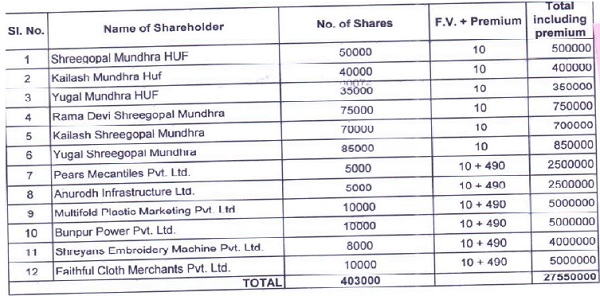
4.2. Assessee also furnished details of the share applicants which included their PAN, registered office address and CIN in the case of company investor details of which is tabulated as under:
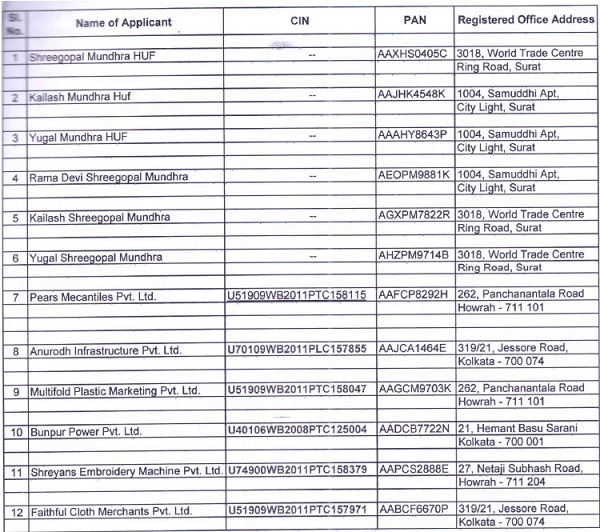
4.3. Not convinced by the details and documentary evidence placed on record, Ld. AO by applying the test of human probability made the addition u/s. 68 of the Act. Aggrieved, assessee went in appeal before the Ld. CIT(A), who after elaborately dealing with the facts of the case on all the three dimensions of section 68 of the Act in respect of identity and creditworthiness of the share subscribers and also the genuineness of the transactions, deleted the addition so made. Aggrieved, the revenue is now in appeal before the Tribunal.
4.4. Before us, Shri P. P. Buman, Sr. DR represented the revenue and Shri Miraj D. Shah, Advocate represented the assessee.
5. Sr. DR placed reliance on the order of Ld. AO and also furnished a written submission in the arguments raised before us. On perusal of the said written statement placed on record, the arguments raised are broadly repetition of the stands taken by the Ld. AO in the impugned assessment order.
6. Counsel for the assessee submitted that to establish the identity and creditworthiness of the shareholders and genuineness of the transactions, assessee has submitted all the relevant details and documents in the course of assessment as well as appellate proceedings, details of which are tabulated in the order of Ld. CIT(A) in para 4.1 and is extracted below for ease of reference:
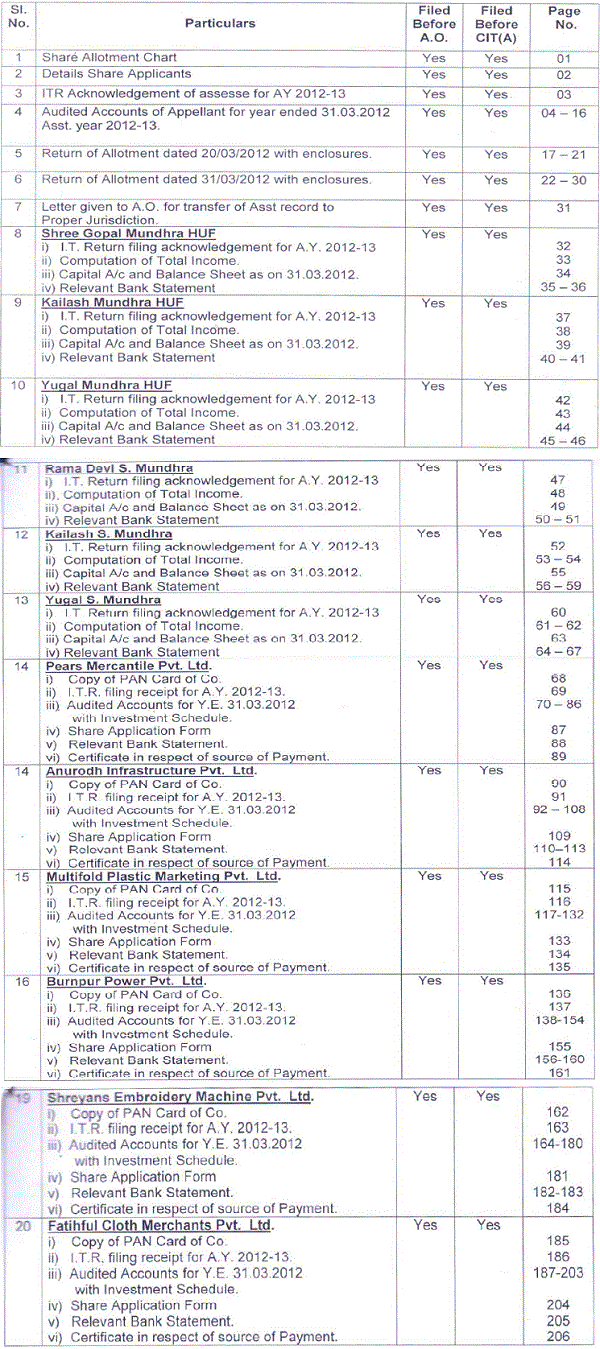
6.1. Ld. Counsel reiterated that the share subscribers are individual, HUF and body corporate, registered with ROC and are assessed to income tax. He further stated that these subscribers had confirmed the transactions, filed relevant papers and documents and also explained the source of funds. He thus, emphasized that assessee had discharged its primary onus casted upon it u/s. 68 of the Act. According to him, the onus thus shifted to the Ld. AO to disprove the material placed before him. Without doing so, the addition made by the Ld. AO is based on conjectures and surmises and, therefore, cannot be sustained.
6.2. Ld. Counsel also emphasized on the fact that in the submissions including ITRs, audit reports, share application details etc. as listed above, the Ld. AO has not found fault in any of the details submitted and simply proceeded to make addition in respect of the amount of share capital and premium. The documents furnished are to be prima facie considered as correct unless evidence is brought on record to falsify the claim made therein.
6.3. On the three basic ingredients for any cash credit viz., identity, creditworthiness of the subscribers and the genuineness of the transactions, Ld. Counsel submitted that all of these are fulfilled. In this respect he submitted as under:
(i) On identity : – All the shareholders are regular income tax assessees and have filed their income tax returns. Ld. Counsel thus emphasized that identity of all the share subscribers is well established and cannot be doubted. Further, he submitted that company subscribers are body corporate registered under the Companies Act, 1956.
That Shareholders are regularly assessed with respective assessing officer as detailed below:-
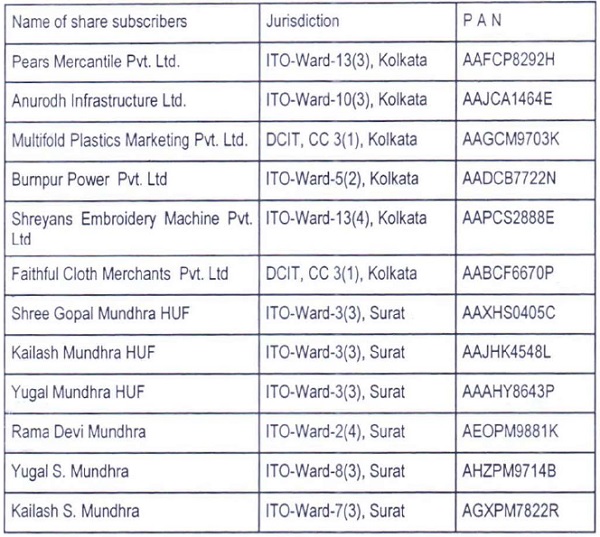
ii) On creditworthiness: To establish the creditworthiness of the subscribers, details relating to source of fund in the hands of these shareholders represented by their respective net worth were furnished along with their respective bank statements and audited financial statements. The details of source of fund furnished by the assessee are reproduced in the table below: It was thus, submitted that the above table unequivocally testifies and proves that the subscribers had sufficient fund for making investment in the share capital of the assessee.
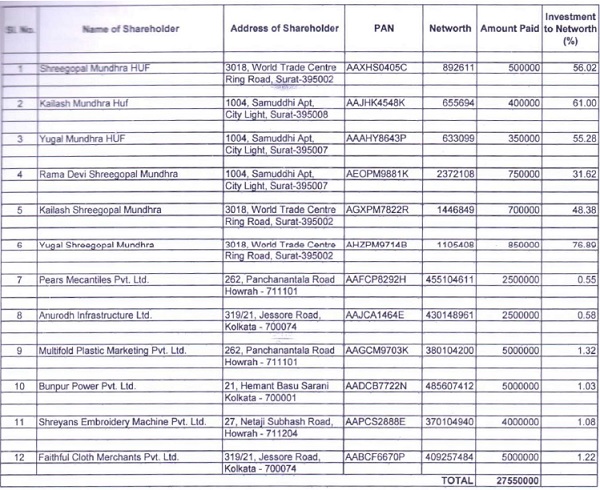
iii) On genuineness of the transaction: It was submitted that the amounts were invested by the subscribers through proper banking channel which is duly reflected in the respective financial statements of the subscribers. Since the investments reflected in their respective financial statements have been duly reported in their respective returns with the Department are thus genuine and transaction cannot be doubted.
7. We have heard the rival contentions and perused the material available on record and have given our thoughtful consideration to the elaborate observations and findings given by the Ld. CIT(A) while giving relief to the assessee.
7.1. From the perusal of the paper book and the documents placed therein, it is vivid that all the share applicants are (i) income tax assessees, (ii) they are filing their income tax returns, (iii) share application form and allotment letter is available on record, (iv) share application money was made by account payee cheques, (v) details of the bank accounts belonging to share applicants and their bank statements, (vi) in none of the transactions there are any deposit of cash before issuing cheques to the assessee, (vii) all the share applicants are having substantial creditworthiness represented by their capital and reserves.
7.2. We also take note of the elaborate and well reasoned findings and decisions arrived at by the Ld. CIT(A) by taking into consideration all the details and documents placed on record. The relevant findings and decisions are extracted as under:
“4.2. I have considered the submission of the AR of the appellant in the backdrop of the assessment order. I have also considered the various judicial decisions referred to by the AO as well as the AR in support of their respective stands in the matter. I have also considered the relevant materials on record in deciding the matter. The brief facts of the issue in the case are that the AO treated the entire share capital raised by the appellant to the extent of Rs.2,76,50,000/- to be assessable u/s. 68 of the Act. On the other hand, the AR of the appellant contested on the action of the AO to the effect that section 68 was not applicable in the appellant’s case for the year under consideration for the following reasons: (a) that identities of the share subscribers stood proven as per documentary evidences (supra) (b) that creditworthiness of the share subscribers stood proven (supra) (c) that the genuineness of the transactions stood proven (supra) and (d) that the share applicants have been regularly assessed to tax by the respective Assessing officers (supra). In such view of the matter, I find the AO cannot abruptly come to the conclusion that section 68 of the Act was applicable in the appellant’s case just for the allegations as launched by the AO. I find that all relevant documentary evidences were before the AO who could have decided the case on merit but however this did not happen. The copies of replies filed by the share applicants appear at Page Nos.26 to 199 of the paper book submitted by the appellant. On an overall analysis of the situation at hand, I find that the AO inspite of all relevant material evidences before him at the assessment stage did not bother to look into those documentary evidences in the right perspective in coming to a right and a fair decision in framing the assessment order. The AO had framed the assessment order based largely on the issue of non attendance of the directors of the share applicant entities before him. The AR has submitted several judicial pronouncements to the effect that mere nonappearance of the share applicant is no basis for invoking provisions of Sec. 68 which includes the decision of the Hon’ble Supreme Court in the case of CIT vs. Orissa Corpn. (P) Ltd. [1986] 159 ITR 78 (SC) wherein the Hon’ble Supreme Court held as follows:
“In this case the assessee had given the names and addresses of the alleged creditors. It was in the knowledge of the revenue that the said creditors were the income tax assesses. Their index number was in the file of the revenue. The revenue, apart from issuing notices under section 131 at the instance of the assessee, did not pursued the matter further. The revenue did not examine the source of income of the said alleged creditors to find out whether they were credit-worthy or were such who could advance the alleged loans. There was no effort made to pursue the so-called alleged creditors. In those circumstances, the assessee could not do any further. In the premises, if the Tribunal came to the conclusion that the assessee had discharged the burden that lay on him, then it could not be said that such a conclusion was unreasonable or perverse or based on no evidence. If the conclusion was based on some evidence on which a conclusion could be arrived at, no question of law as such could arise. The High Court was, therefore, right in refusing to refer the questions sought for. Decision of the High Court affirmed.”
In view of the foregoing discussion as well as the judicial pertinent to the issue at hand (supra), I do not find any premise to endorse the action of the AO in making the impugned addition of Rs.2,76,50,000/- as unexplained cash credit u/s 68 of the Act.
5. Even with ‘respect to charging of high premium, the matter is well covered by various judicial decisions that once the identities and creditworthiness of the share applicants and genuineness of the transaction are established, Sec. 68 cannot be invoked on the ground of high share premium as contended by the AR. Relevant case laws on the matter are as follows: (a) PCIT vs. Chain House International (P.) Ltd. [2018] 98 com 47 (Madhya Pradesh) (b) Principal Commissioner of Income Tax v. Rohtak Chain Co. (P.) Ltd. [2019] 110 taxmann.com 59 (SC), (c) Principal Commissioner of Income-tax v. Bharat Securities (P.) Ltd. [2020] 113 taxmann.com 32 (SC).
6. Further, I find that the share subscribers have enough net worth in their balance sheet to make investments in shares of the appellant company as depicted hereinunder:
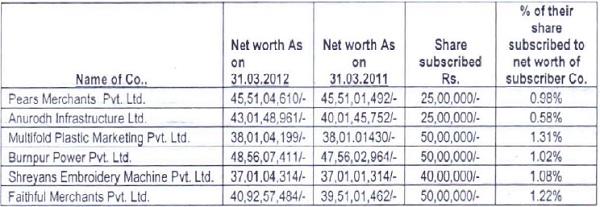
8. Ld. CIT(A) also distinguished the various case laws which Ld. AO relied upon while making the assessment. The observations and finding given by the Ld. CIT(A) in this respect are reproduced as under:
“6.2. Basically the law requires documentary evidences on record in dealing with the issue of authenticity. It is not the case of the AO that necessary documentary evidences are not on record but the only major reliance placed on his action is based on non-attendance of the directors of the assessee-company before him u/s 131 of the Act. It is no longer res integra that such non-attendance should be considered as a factor which should be used by the AO in coming to an adverse conclusion against the appellant. On an overall analysis of the issue, I find that the AO has not made out his case with cogent material on record that the appellant could come under the purview of section 68 of the Act with regard to share capital as reflected in the balance sheet when there is no finding with any cogent material evidence that the same was actually bogus in nature. It is accordingly observed that creditworthiness of the share subscribers to make investment in the share capital of the appellant company cannot be a disputed matter as per material facts on record. The aforesaid facts underlined by evidences clearly prove the identity of the share applicants, their creditworthiness and source of funds, as well as the genuineness of the transactions being investments in the share capital issued by the appellant, which was subscribed to by each of them. Thus, it is proved beyond any doubt or dispute that the share applicants are actually found to have subscribed to the share capital issued by the appellant during the year under consideration as clearly evident not only from their respective books of accounts but also from their audited accounts filed with the income tax authorities in relation to their own income tax assessments. However, the had not brought these indisputable facts on record but acted on his whims and fancies. It is observed that the burden, which lay on the appellant, in relation to section 68 of the Act, has been duly discharged by it and nothing further remains to be proved by it on the issue. Since the conditions precedent for discharging of burden of proof under the provisions of section 68 of the Act is met with adequate evidence, the addition made under such pretext deserves to be deleted.”
9. While concluding, Ld. CIT(A) gave his finding by placing reliance on the decision of Hon’ble jurisdictional High Court in the case of CIT Vs. Dataware Pvt. Ltd. in ITAT No. 263 of 2022 dated 21.09.2011. His concluding findings are reproduced as under:
“6.5. There is no evidence adduced on record to show by the AO that the identities of the share applicants are not proved and/or that the subscription made by them to the share capital of the appellant was not genuine and/or the source of investment was not fully explained to the satisfaction of the AO. Further, the Hon’ble Jurisdictional High Court in the case of CIT VS. Dataware Private Ltd. [ITAT No. 263 of 2011 dated 21.09.2011] wherein while examining the issue of addition of share application money received by the assessee therein u/s 68 of the Act, it was held that after getting the PAN number and getting the information that the creditor is assessee under the Act, the Assessing Officer should enquire from the Assessing Officer of the creditor as to the genuineness of the transaction and whether such transaction has been accepted by the Assessing Officer of the Creditor but instead of adopting such course, the Assessing Officer himself could not enter into the return of the creditor and brand the same as unworthy of credence. The Hon’ble High Court further held that so long as it is not established that the return submitted by the creditor (subscriber shareholder) has been rejected by its Assessing Officer, the Assessing Officer of the assessee is bound to accept the same as genuine when the identity of the creditor and the genuineness of transaction through account payee cheque has been established. In the present case also, no evidence was adduced on record to show that the investments made with the appellant in the shape of share application monies disclosed in the returns of the share applicants were rejected by their respective Assessing Authorities and accordingly, the issue is set at rest by the decision of the jurisdictional High Court on the issue which is applicable in the present context. In view of the foregoing, the AO is directed to delete the impugned amount of Rs.2,76,50,000/- made u/s 68 of the Act. These grounds are allowed.”
10. Similarly the Hon’ble Calcutta High Court in the case of PCIT Vs. Naina Distributors Pvt. Ltd. in ITAT/113/2023, IA No. GA/1/2023 dated 28.06.2023 has decided the issue in favour of the assessee by holding that mere non-production of director cannot be the ground for making any addition in the hands of assessee u/s 68 of the Act. The operative part is reproduced as under:
“After carefully considering the findings recorded by the Commissioner of Income Tax, (Appeals) 7 Kolkata (CITA) in his order dated 21.09.2020 and the findings recorded by the learned Tribunal we find that the entire matter is fully factual. The learned Tribunal has
independently examined as to the genuinity of the transaction in the matter of raising share capital and the Tribunal noted that even during the assessment proceedings, the assessee has furnished all details ill respect of the share capital and share premium raised by the assessee besides the details of the investors by their submission dated 9.6.2014 in reply to the notice issued by the Assessing Officer under Section 142 of the Act dated 5.5.2014. The Tribunal also noted that the assessee had produced all documents, disclosed the names and addresses and PAN Numbers of the investors, copies of the share allotment advice, copies of the share application form, bank statement, statement giving details of share application, money receipt during the year, copy of Form No.2 evidencing return of allotment and copy of Form No.5 for increase in various capital. Further the assessing officer has issued notice to the investors under Section 133(6) on 11.06.2014 for carrying out independent verification of the transaction and those investors duly responded to those notice and filed the requisite details such as the number of shares subscribed, ledger account, bank statement, explanation for source of funds, income tax returns and audited financial statements and also assessment order framed under Section 143(3) of the Act in all the cases. The Tribunal further noted that in spite of such being the factual position, the only reason for making the addition in the hands of the assessee the director of the assessee company did not respond to the summons issued by the assessing officer under Section 131 of the Act. The correctness of this was also considered by the learned Tribunal and it was held that non appearance of the director cannot be made a ground for addition in the hands of the assessee under Section 68 of the Act when other evidence relating to the raising of share capital qua the share subscriber were available on record as furnished by the assessee and also cross verified by the assessing officer pursuant to the enquiry conducted in response to the notices issued under Section 133(6) of the Act. The learned Tribunal also referred to the decision of this Court in the case of Crystal Networks Pvt. Ltd. Vs. CIT reported in 353 ITR 171 (CAL).
Thus we find that there is no question of law much less substantial question of law arising for consideration in this appeal.
Accordingly, the appeal fails and is dismissed.”
11. Before concluding, to give our finding, we place reliance on the following judicial precedents to buttress our observations and conclusions :
i) The decision of Hon’ble Jurisdictional High Court of Calcutta in the case of CIT v. Dataware Pvt. Ltd. in ITAT No. 263 of 2011 dated 21.09.2011 wherein Hon’ble jurisdictional High Court held that
“After getting the PAN number and getting the information that the creditor is assessed under the Act, the Assessing officer should enquire from the Assessing Officer of the creditor as to the genuineness” of the transaction and whether such transaction has been accepted by the Assessing officer of the creditor but instead of adopting such course, the Assessing officer himself could not enter into the return of the creditor and brand the same as unworthy of credence.”
ii) Decision of Hon’ble jurisdiction High Court of Calcutta in the case of CIT Vs. Sagun Commercial P. Ltd. (ITA No. 54 of 2001 dated 17.021.2011) wherein it was held as under:
“After hearing the learned advocate for the appellant and after going through the materials on record, we are at one with the Tribunal below as well as the Commissioner of Income-tax (Appeals) that the approach of the Assessing Officer cannot be supported. Merely because those applicants were not placed before the Assessing Officer, such fact could not justify disbelief of the explanation offered by the assessee when details of Permanent Account Nos. payment details of shareholding and other bank transactions relating to those payments were placed before the Assessing Officer. It appears that the Tribunal below has recorded specifically that the Assessing Officer totally failed to consider those documentary evidence produced by the assessee in arriving at such conclusion.
We, therefore, find no reason to interfere with the decision passed by the Commissioner of Income-tax (Appeals) and the Tribunal below and answer the questions formulated by the Division Bench in the affirmative and against the Revenue. The appeal is, thus, dismissed.”
iii) Decision of Hon’ble Bombay High Court in the case of CIT v. Creative World Telefilms P. Ltd. (2011) 333 ITR 100 (Bom) wherein it was held as under:
“In the case in hand, it was not disputed that the assessee had given the details of name and address of the shareholder, their PAN/GIR number and had also given the cheque number, name of the bank. It was expected on the part of the Assessing Officer to make proper investigation and reach the shareholders. The Assessing Officer did nothing except issuing summons which were ultimately returned back with an endorsement “not traceable”. The Assessing Officer ought to have found out their details through PAN cards, bank account details or from their bankers so as to reach the shareholders since all the relevant material details and particulars were given by the assessee to the Assessing Officer. In the above circumstances, the view taken by the Tribunal could not be faulted. No substantial question of law was involved in the appeal.’‘
iv) Decision of Hon’ble Madras High Court in the case of Pranav foundations Ltd. (2015) 229 Taxman 58 (Mad) is also referred wherein it was held as under:
“In view of the fact that all the four parties, who are subscribers of the shares, are limited companies and enquiries were made and received from the four companies and all the companies accepted their investment. Thus, the assessee has categorically established the nature and source of the said sum and discharged the onus that lies on it in terms of section 68. When the nature and source of the amount so invested is known, it cannot be said to undisclosed income. Therefore, the addition of such subscriptions as unexplained credit under section 68 is unwarranted.”
12. In the course of assessment proceeding, Ld. AO by issuing notices u/s. 131 directed the assessee to produce the director of the assessee and also the directors of the subscribers along with relevant documentary evidence and details which was not complied with. Ld. Counsel submitted that mere non-appearance of directors is no basis for invoking provisions of section 68 of the Act for which he placed reliance on the decision of Hon’ble Supreme Court in the case of CIT v. Orissa Corporation (P) Ltd. (1986) 159 ITR 78 (SC) wherein it was held as under:
“In this case the assessee had given the names and addresses of the alleged creditors. It was in the knowledge of the revenue that the said creditors were the income-tax assessees. Their index number was in the file of the revenue. The revenue, apart from issuing notices under section 131 at the instance of the assessee, did not pursue the matter further. The revenue did not examine the source of income of the said alleged creditors to find out whether they were credit-worthy or were such who could advance the alleged loans. There was no effort made to pursue the so-called alleged creditors. In those circumstances, the assessee could not do any further. In the premises, if the Tribunal came to the conclusion that the assessee had discharged the burden that lay on him, then it could not be said that such a conclusion was unreasonable or perverse or based on no evidence. If the conclusion was based on some evidence on which a conclusion could be arrived at, no question of law as such could arise.
The High Court was, therefore, right in refusing to refer the questions sought for. Decision of the High Court affirmed.”
13. We note that Ld. AO has further relied upon the decision in the case of M/s Bisakha Sales Pvt. Ltd. v CIT [2014] 52 com 305 (Kolkata- Trib.). In this case, it was held that where assessee-company received share application money with huge and unjustified share premium from corporate entities, merely because said amount was received through banking channel, Assessing Officer was not justified in accepting said transactions as genuine without making proper enquiries. Apparently, the AO has not properly appreciated that decision of the Hon’ble IT AT. The Hon’ble ITAT has never held that share capital and share premium can be assessed as unexplained cash credit merely for high share premium even though the identities and creditworthiness of the share applicant and genuineness of the transactions have been established. What is held by the Hon’ble ITAT is that revision proceedings u/s 263 are valid where the transactions have been accepted as genuine without making proper enquiries.
14. Further, in respect of ground nos. 2, 3, 4 and 5, reference to the judgment of Hon’ble Supreme Court in the case of NRA Iron & Steel Pvt. Ltd. (412 ITR 161) is found to be distinguishable on facts in as much as in the said decision, Ld. AO has made extensive enquiries and some of investors were found to be non-existent. Upon going through the facts involved in that judgment, it is noted that, in the decided case the AO had made extensive enquiries and from that he had found that some of the investor companies were non-existent, which is certainly not the case before the undersigned. In the decided case, certain investor companies also failed to produce their bank statements proving the source for making investments in assessee company. In the facts of the present case however not only have the shareholders furnished their bank statements and investment schedules to establish the source of funds but they have also furnished their respective sources of funds.
15. Considering the facts and circumstances narrated and analysed above, all the details and documents placed on record corroborating the claim of the assessee, the judicial precedents referred above and detailed and exhaustive exercise undertaken by the Ld. CIT(A), we uphold the order of Ld. CIT(A) without any interference. Accordingly, addition made by the Ld. AO towards share capital including share premium of Rs.2,76,50,000/- is directed to be deleted. Thus, grounds taken by the revenue in this regard are dismissed.
16. In the result, appeal of the revenue is dismissed. Order pronounced in the open court on 01.01.2024.




